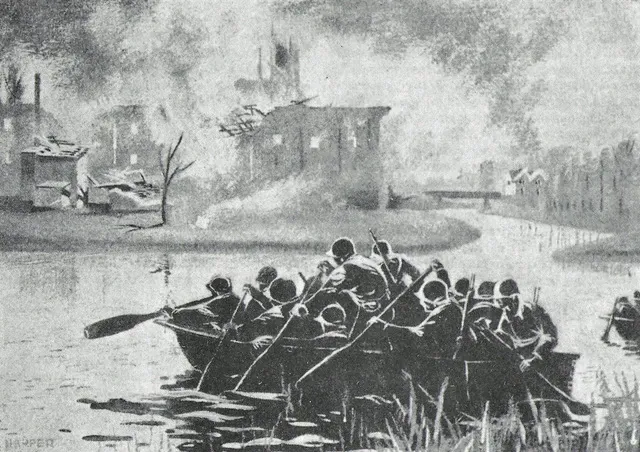US Division under Canadian command!
Before this, never in military history had a US Division operated under the command of a Canadian general. This rather unusual honour occurred for the US 104th Infantry Division, better known as the Timberwolf Division, in West Brabant.
West Brabant was liberated by a truly international force. General Crerar's First Canadian Army commanded British, Polish and American Divisions in addition to Canadian divisions. The American Divison had liberated Oudenbosch and its famous Basilica on 30 October 1944.
The ultimate goal for the American Division was to reach the Hollands Diep river. The "Timberwolves" was the first Division to sail directly from America to Normandy in August 1944. However, due to supply problems, the division had to wait until October 1944 to be sent to the front. The First Canadian Army needed reinforcements, and so Major General Terry Allen's 104th Division had its first combat experience in an area south of Breda.
At the end of October, they faced the tough job of crossin…
West Brabant was liberated by a truly international force. General Crerar's First Canadian Army commanded British, Polish and American Divisions in addition to Canadian divisions. The American Divison had liberated Oudenbosch and its famous Basilica on 30 October 1944.
The ultimate goal for the American Division was to reach the Hollands Diep river. The "Timberwolves" was the first Division to sail directly from America to Normandy in August 1944. However, due to supply problems, the division had to wait until October 1944 to be sent to the front. The First Canadian Army needed reinforcements, and so Major General Terry Allen's 104th Division had its first combat experience in an area south of Breda.
At the end of October, they faced the tough job of crossing the river Mark, south of Standdaarbuiten village. An initial attempt by several dozen American soldiers on the east side of the village failed. They were overrun by the German troops in a counterattack. Only a few managed to hold out, whilst the rest fell or were captured. Achieving an American bridgehead required a bigger approach.
After two days of intense preparation, the 2nd Battalion of the 413th Infantry Regiment (known as "The Seagulls" and numbering about 600 men), attacked at exactly 21:00 on Friday 3 November. They rowed in boats across the Mark on the west side of Standdaarbuiten. Intense artillery fire accompanied the American soldiers and caused much damage in the village, with many fires. The German troops could not prevent the American forces from reinforcing their positions across the Mark. By midnight, the number of American soldiers near Standdaarbuiten had increased to just under 2,000 men. Now was the moment to build an emergency bridge across the Mark, at the site of the old blown-up bridge (end of Veerstraat). The Timberwolves could now bring in heavy equipment to support the advance. This was a decisive moment for the fighting in and around Standdaarbuiten. The only thing that their opponent, the German 346th Infantry Division, could do was to slowly retreat. The flat marshland landscape north of Standdaarbuiten helped in this regard.
Finally, a group of American soldiers reached the Hollands Diep river on the afternoon of Sunday 5 November around 16:15, near the hamlet Roode Vaart. The final destination had been reached! Next, because the American offensive at Aachen had come to a standstill, the "Timberwolves" were needed there quickly to help.
This is how to reach US Division under Canadian command!
4758 BP Standdaarbuiten Plan your route naar US Division under Canadian command!
Starting point: from your location

